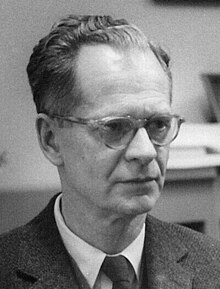B. F. Skinner | |
|---|---|
 Skinner, c. 1950 | |
| Born | Burrhus Frederic Skinner March 20, 1904 |
| Died | August 18, 1990 (aged 86) Cambridge, Massachusetts, U.S. |
| Alma mater | Hamilton College (AB) Harvard University (PhD) |
| Known for | Behavior analysis Operant conditioning Radical behaviorism Verbal Behavior (1957) |
| Spouse |
Yvonne (Eve) Blue (m. 1936) |
| Children | Julie and Deborah |
| Awards | National Medal of Science (1968) |
| Scientific career | |
| Fields | Psychology, linguistics, philosophy |
| Institutions | University of Minnesota Indiana University Harvard University |
| Signature | |
Burrhus Frederic Skinner (March 20, 1904 – August 18, 1990) was an American psychologist, behaviorist, inventor, and social philosopher.[2][3][4][5] He was the Edgar Pierce Professor of Psychology at Harvard University from 1958 until his retirement in 1974.[6]
Skinner developed behavior analysis, especially the philosophy of radical behaviorism,[7] and founded the experimental analysis of behavior, a school of experimental research psychology. He also used operant conditioning to strengthen behavior, considering the rate of response to be the most effective measure of response strength. To study operant conditioning, he invented the operant conditioning chamber (aka the Skinner box),[8] and to measure rate he invented the cumulative recorder. Using these tools, he and Charles Ferster produced Skinner's most influential experimental work, outlined in their 1957 book Schedules of Reinforcement.[9][10]
Skinner was a prolific author, publishing 21 books and 180 articles.[11] He imagined the application of his ideas to the design of a human community in his 1948 utopian novel, Walden Two,[3] while his analysis of human behavior culminated in his 1958 work, Verbal Behavior.[12]
Skinner, John B. Watson and Ivan Pavlov, are considered to be the pioneers of modern behaviorism. Accordingly, a June 2002 survey listed Skinner as the most influential psychologist of the 20th century.[13]
- ^ Sobel, Dava (August 20, 1990). "B. F. Skinner, the Champion Of Behaviorism, Is Dead at 86". The New York Times. Archived from the original on August 6, 2010. Retrieved August 30, 2015.
- ^ Smith, L. D.; Woodward, W. R. (1996). B. F. Skinner and Behaviorism in American Culture. Bethlehem, Pennsylvania: Lehigh University Press. ISBN 978-0-934223-40-9.
- ^ a b Skinner, B. F. (1948). Walden Two. New York: Macmillan Publishers. ISBN 0-87220-779-X.
The science of human behavior is used to eliminate poverty, sexual expression, government as we know it, create a lifestyle without that such as war.
- ^ Skinner, B. F. (1972). Beyond Freedom and Dignity. Vintage Books. ISBN 978-0-553-14372-0. OCLC 34263003.
- ^ "Skinner, Burrhus Frederic". History of Behavior Analysis. Retrieved July 29, 2021.
- ^ Swenson, Christa (May 1999). "Burrhus Frederick Skinner". History of Psychology Archives. Archived from the original on April 4, 2007.
- ^ Skinner, B. F. (1974). About Behaviorism. Random House. ISBN 0-394-71618-3.
- ^ Schacter, Daniel L.; Gilbert, Daniel T.; Wagner, Daniel M. (2011). Psychology (2nd ed.). New York: Worth Publishers. p. 17. ISBN 978-1-4292-3719-2.
- ^ Skinner, B. F. (1938). The Behavior of Organisms. New York: Appleton-Century-Crofts. ISBN 1-58390-007-1.
- ^ Ferster, Charles B.; Skinner, B. F. (1957). Schedules of Reinforcement. New York: Appleton-Century-Crofts. ISBN 0-13-792309-0.
- ^ Smith, Nathaniel G.; Morris, Edward K. (2021). "Full Bibliography". B. F. Skinner Foundation. Retrieved July 29, 2021. Also available as a PDF.
- ^ Skinner, B. F. (1958). Verbal Behavior. Acton, Massachusetts: Copley Publishing Group. ISBN 1-58390-021-7.
- ^ Haggbloom, Steven J.; Warnick, Renee; Warnick, Jason E.; Jones, Vinessa K.; et al. (June 1, 2002). "The 100 most eminent psychologists of the 20th century". Review of General Psychology. 6 (2): 139–52. CiteSeerX 10.1.1.586.1913. doi:10.1037/1089-2680.6.2.139. S2CID 145668721.